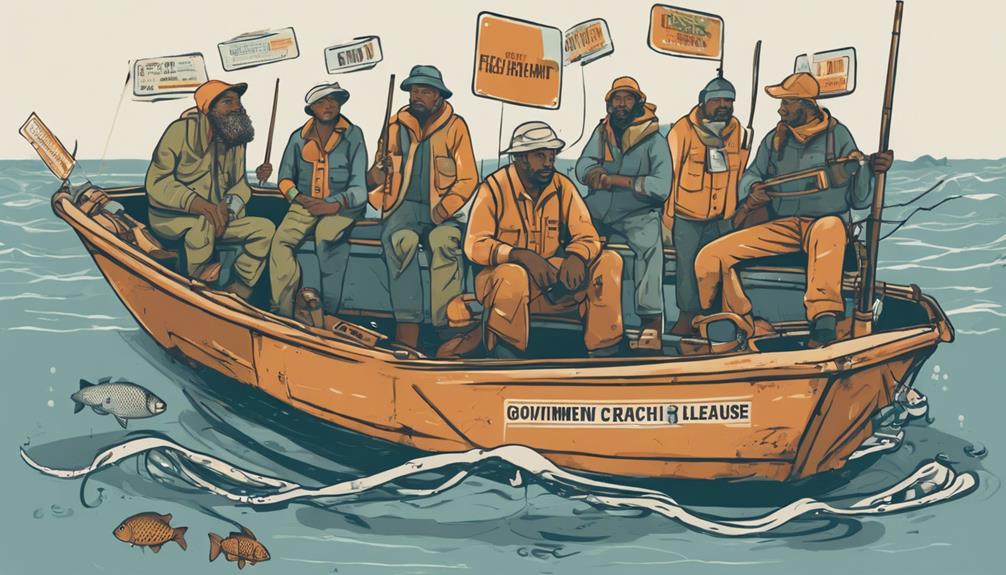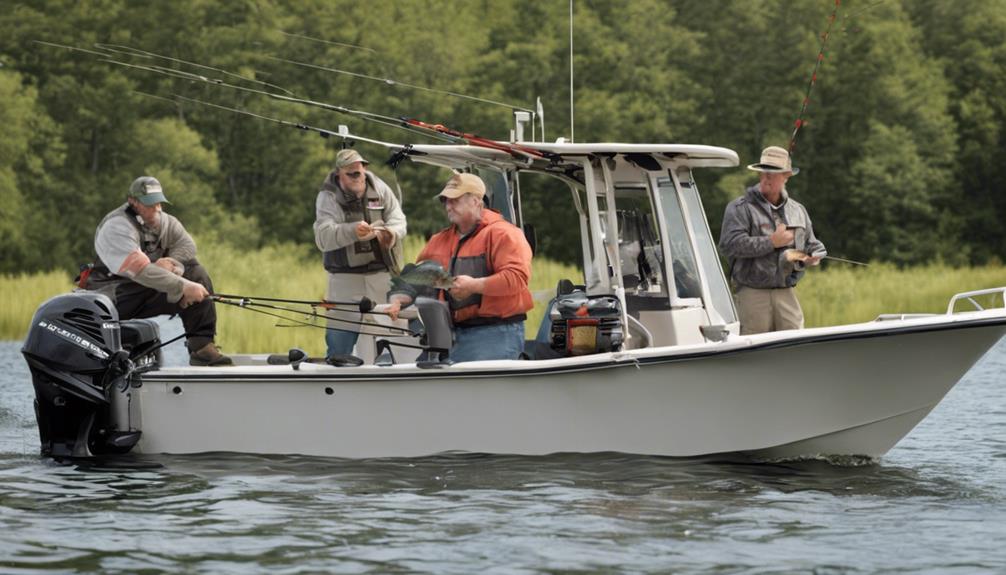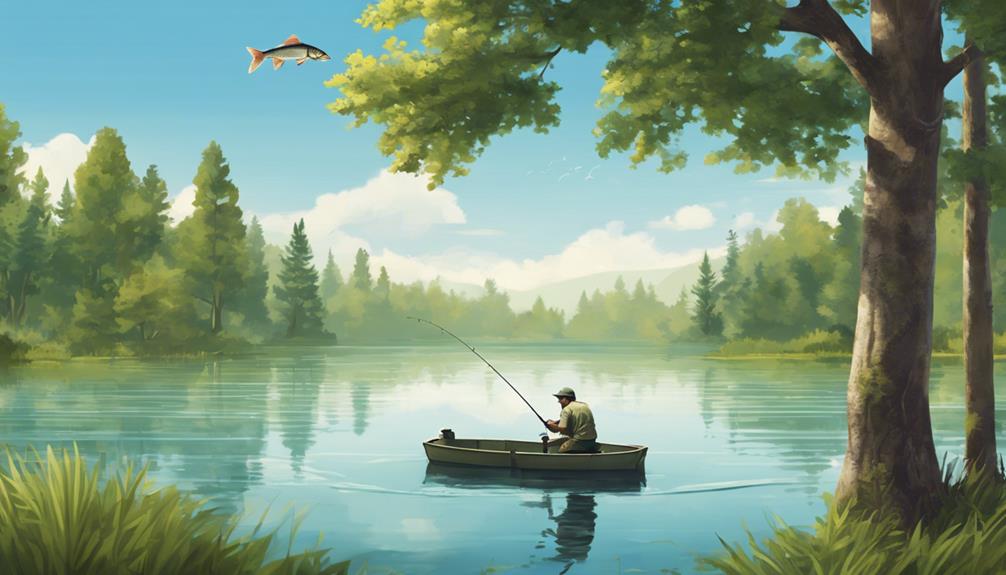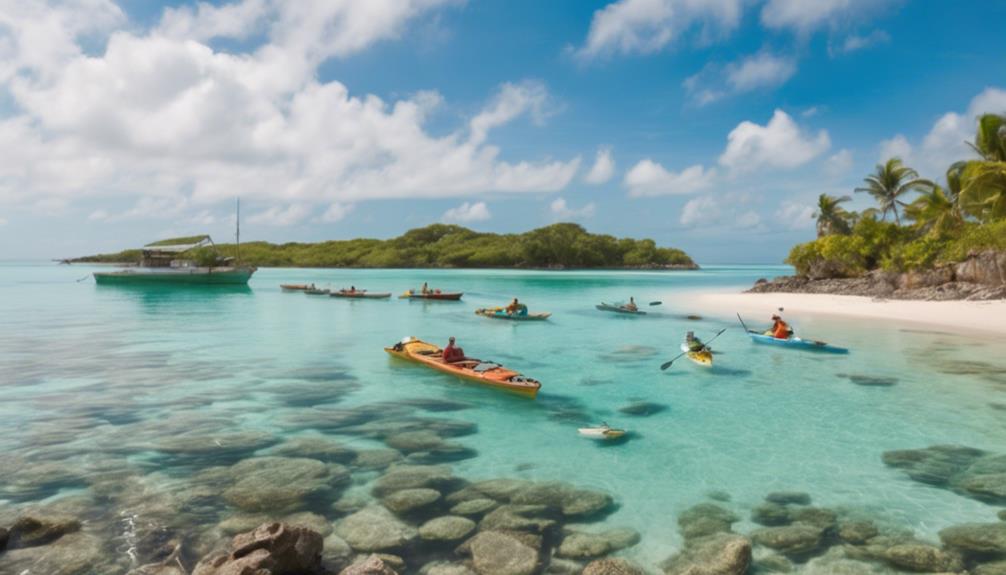Imagine a vast ocean teeming with fish like a bustling city full of opportunities. Just like a city needs responsible citizens to thrive, our oceans need sustainable fishing practices to ensure a healthy ecosystem.
But what happens when greed takes over and resources are exploited without thought for the future? The consequences can be dire, impacting not only marine life but also the livelihoods of communities dependent on fishing.
How can we strike a balance between reaping the benefits of the sea and preserving it for generations to come?
Importance of Sustainable Fishing
Understanding why sustainable fishing is crucial can lead to positive changes in our oceans' health and future. By promoting responsible consumption practices in fishing, we can protect and preserve marine ecosystems for generations to come.
Marine ecosystems are delicate and intricate systems that rely on a balance of various species to thrive. Overfishing and unsustainable fishing practices have led to a decline in fish populations, disrupting the delicate balance of these ecosystems. It's essential to understand that our actions as consumers directly impact the health of marine ecosystems. By choosing sustainably sourced seafood, you can contribute to the conservation of marine biodiversity and the overall health of our oceans.
Responsible consumption plays a significant role in promoting sustainable fishing practices. When you opt for seafood that's harvested using sustainable methods, you're supporting fisheries that prioritize long-term environmental conservation. By being mindful of where your seafood comes from and how it's caught, you can help reduce the negative impacts of overfishing and bycatch on marine ecosystems. Your choices as a consumer have the power to drive positive change in the fishing industry, encouraging more fishermen to adopt sustainable practices that protect our oceans.
Sustainable Fishing Techniques
To ensure the sustainability of fishing practices, adopting innovative and eco-friendly methods is paramount in safeguarding marine ecosystems. Responsible harvesting techniques play a crucial role in maintaining fish populations and preserving marine biodiversity. By practicing ethical fishing methods, such as using selective gear to reduce bycatch and avoiding sensitive habitats, you contribute to the long-term health of our oceans.
Engaging in marine stewardship involves taking collective responsibility for the health of marine environments. Implementing sustainable fishing techniques not only benefits fish populations but also supports the livelihoods of fishing communities around the world. Choosing sustainable seafood options, like species that aren't overexploited or caught using destructive methods, helps in promoting a healthier marine ecosystem.
Innovations in fishing gear, such as using biodegradable materials and designing more efficient traps, can significantly reduce the environmental impact of fishing activities. By embracing these advancements and encouraging others to do the same, you actively participate in the conservation of marine resources.
Conservation of Fish Populations
In safeguarding fish populations, prioritizing sustainable fishing practices is essential to ensure the long-term health of marine ecosystems. To effectively conserve fish populations, consider the following strategies:
- Fish Population Management: Implementing sustainable solutions such as setting catch limits, regulating fishing gear types, and establishing marine protected areas can help maintain healthy fish populations. By carefully monitoring and managing fish stocks, it's possible to prevent overfishing and ensure the sustainability of fisheries for future generations.
- Marine Biodiversity Conservation: Adopting sustainable strategies like promoting habitat restoration, reducing bycatch through the use of selective fishing gear, and supporting research on the impact of climate change on marine ecosystems can contribute to the conservation of marine biodiversity. Protecting the diverse range of fish species and their habitats is crucial for maintaining the balance of marine ecosystems.
- Community Engagement: Involving local communities, fishers, and stakeholders in decision-making processes regarding fish population management and conservation efforts can enhance the effectiveness of sustainable practices. By fostering collaboration and raising awareness about the importance of preserving fish populations, we can work together towards a more sustainable future for our oceans.
Eco-friendly Angling Equipment
When considering eco-friendly angling equipment, prioritize sustainability by choosing gear that minimizes environmental impact. Opting for biodegradable lures and reels is a great way to reduce waste in water bodies. These eco-friendly options break down naturally over time, preventing them from becoming marine debris and harming aquatic life. Additionally, investing in solar-powered boats and gear can significantly decrease the carbon footprint of your angling activities. By harnessing the power of the sun, you can enjoy your time on the water while minimizing reliance on fossil fuels.
Biodegradable lures and reels are designed to degrade in a way that isn't harmful to the environment, making them an excellent choice for eco-conscious anglers. When these items eventually break down, they don't leave behind harmful microplastics or toxins that can pollute water sources. Solar-powered boats and gear are another eco-friendly option that can help reduce your impact on the environment. By using renewable energy sources, you can enjoy a day of angling without contributing to air and water pollution.
Impact of Overfishing
Considering the dwindling fish populations, understanding the impact of overfishing is crucial for promoting sustainable fishing practices. Overfishing occurs when more fish are caught than the population can replace through natural reproduction, leading to a depletion of fish stocks. This has severe consequences on marine ecosystems and the fishing industry as a whole.
Key Impacts of Overfishing:
- Marine Biodiversity: Overfishing disrupts the delicate balance of marine ecosystems, causing a decline in various fish species. This imbalance can lead to cascading effects throughout the food chain, impacting other marine organisms and habitats.
- Economic Implications: Overfishing not only affects the environment but also has significant economic consequences. Depleted fish stocks result in lower catches for fishermen, leading to a decline in income and potential job losses in the fishing industry. Moreover, it can also impact related industries like seafood processing and distribution.
- Regulatory Challenges: Overfishing highlights the challenges of implementing effective fisheries management practices. Enforcing regulations to prevent overfishing can be complex due to factors like illegal fishing activities, lack of international cooperation, and difficulties in monitoring vast marine areas.
Understanding the impact of overfishing is essential to ensure the long-term sustainability of fish populations and the fishing industry. By addressing these issues, stakeholders can work together to implement strategies that promote responsible fishing practices and protect marine biodiversity.
Community Involvement in Conservation
To further address the impact of overfishing and promote sustainable fishing practices, engaging local communities in conservation efforts is crucial. Community engagement plays a vital role in the success of conservation initiatives. By involving the local community in decision-making processes and conservation projects, a sense of ownership and responsibility towards marine resources is fostered.
One effective way to promote community involvement in conservation is through education and awareness programs. By organizing workshops, seminars, and training sessions, community members can learn about the importance of sustainable fishing practices and the negative impacts of overfishing. This knowledge empowers them to become stewards of the environment and advocates for responsible fishing habits.
In addition to education, collaborative conservation initiatives such as community-based marine protected areas can be established. These initiatives involve local fishers, government agencies, and non-profit organizations working together to protect vulnerable marine ecosystems. By actively participating in the planning and management of these protected areas, community members contribute to the preservation of marine biodiversity and the restoration of fish stocks.
Ultimately, community involvement in conservation not only helps combat overfishing but also strengthens social cohesion and promotes sustainable livelihoods. By working together towards a common goal of protecting our oceans, local communities can ensure a healthier marine environment for future generations.
Government Regulations for Fishing

Government regulations play a crucial role in managing and ensuring the sustainability of fishing practices. These regulations are essential to maintain fish populations and protect the marine ecosystem for future generations. Here are three key aspects to consider regarding government regulations for fishing:
- Regulatory Compliance: It's vital for fishers to adhere to established regulations to prevent overfishing and ensure the longevity of fish stocks. By following size limits, catch quotas, and seasonal restrictions, regulatory compliance helps in maintaining a balance between fishing activities and conservation efforts. Government agencies often monitor compliance through inspections and electronic monitoring systems, imposing penalties for violations.
- Enforcement Measures: Strong enforcement of fishing regulations is necessary to deter illegal practices and protect vulnerable species. Patrols, surveillance technologies, and penalties for non-compliance play a significant role in deterring unlawful fishing activities. Collaborative efforts between law enforcement agencies and local communities are crucial to effectively enforce regulations and combat illegal fishing practices.
- Stakeholder Engagement and Policy Advocacy: Involving stakeholders such as fishers, conservationists, and policymakers in the regulatory process is essential for creating effective and widely accepted fishing regulations. Stakeholder engagement allows for diverse perspectives to be considered, leading to more comprehensive and sustainable policies. Furthermore, policy advocacy by conservation groups and concerned citizens can influence decision-makers to implement stricter regulations for the protection of marine resources.
Promoting Catch and Release Practices
To promote sustainable fishing practices, encouraging the adoption of catch and release methods is vital. Fisheries management relies on responsible angling practices to ensure the conservation of fish populations. By practicing catch and release, you play a crucial role in maintaining healthy fish stocks and preserving aquatic ecosystems for future generations.
Catch and release involves unhooking the fish carefully and releasing it back into the water, allowing it to survive and potentially reproduce. This method promotes ethical angling practices by minimizing harm to fish populations and reducing unnecessary mortality rates. When done correctly, catch and release can help support sustainable fisheries management efforts.
Remember, when practicing catch and release, handle the fish with wet hands to protect its slime layer, avoid causing unnecessary stress by keeping it out of the water for too long, and use barbless hooks to facilitate easy release. Additionally, using proper gear and techniques can increase the chances of a successful release, ensuring the fish swims away healthy and unharmed.
Incorporating catch and release practices into your fishing routine not only contributes to the conservation of fish populations but also promotes responsible angling behavior. By respecting the environment and the fish you catch, you actively participate in the preservation of aquatic ecosystems and support sustainable fisheries management efforts.
Frequently Asked Questions
What Are Some Ways Individuals Can Support Sustainable Fishing Practices Beyond Using Eco-Friendly Angling Equipment?
To support sustainable fishing practices beyond gear, you can join community initiatives and educate others. Advocate for policies that protect our oceans and promote sustainable sourcing.
Share knowledge and engage in programs that raise awareness about responsible fishing. Your actions can make a big difference in preserving marine ecosystems for future generations.
How Do Different Fishing Methods Impact Fish Populations and Ecosystems Differently?
When you consider how different fishing methods can impact fish populations and ecosystems, it's crucial to understand the consequences.
Overfishing impacts vary based on the technique used, with some methods more destructive than others. Conservation strategies are essential to mitigate these effects and preserve fish populations.
Ecosystem health is closely tied to fishing methods, as unsustainable practices can disrupt the balance of marine environments. It's vital to choose fishing methods that are mindful of conservation and sustainability.
Are There Any Innovative Technologies Being Developed to Help Monitor and Enforce Sustainable Fishing Practices?
When it comes to monitoring sustainable fishing practices, there are some exciting technological advancements on the horizon. Surveillance systems and electronic monitoring tools are being developed to help enforce regulations and ensure compliance with sustainable fishing practices.
These innovations aim to provide more accurate data on fishing activities and help authorities take necessary enforcement measures to protect fish populations and ecosystems. Stay tuned for the latest updates on these cutting-edge solutions in fisheries management.
How Can Local Communities Get Involved in Conservation Efforts to Protect Fish Populations?
To get involved in protecting fish populations, local communities can take part in conservation initiatives.
You can organize clean-up events near water bodies, advocate for sustainable fishing practices, and educate others on the importance of preserving marine ecosystems.
What Role Do Consumer Choices and Seafood Certifications Play in Promoting Sustainable Fishing Practices?
When it comes to promoting sustainable fishing practices, your consumer choices and awareness play a crucial role.
By paying attention to seafood labeling and certifications, you can make informed decisions that support fisheries following sustainable practices. Your choices directly impact the demand for responsibly sourced seafood, driving the industry towards more environmentally friendly methods.
Conclusion
Overall, promoting sustainable practices in fishing and angling is crucial for preserving our marine ecosystems and ensuring the future of fishing for generations to come.
By using sustainable techniques, conserving fish populations, using eco-friendly equipment, and practicing catch and release, we can make a positive impact on the environment.
It's important for individuals, communities, and governments to work together to protect our oceans and promote responsible fishing practices.



